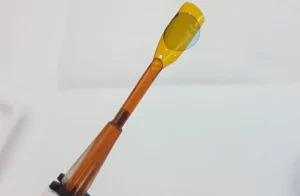These bio-printed eye tissues would be used for transplants to treat vision correction and corneal diseases such as keratoconus.

We’re one step closer to a 1950s sci-fi writer’s vision of the future of medicine. On Monday, medical technology company Carl Zeiss Meditec (ZEISS) entered into a partnership with Precise Bio, a regenerative medicine startup advancing the use of bio-printed tissues and organs, in order to develop and commercialize fabricated corneal tissue.
These bio-printed eye tissues would be used for transplants to treat vision correction and corneal diseases such as keratoconus (a condition wherein one’s cornea bulges into a cone shape due to thinning tissues).
The deal has two main components: an equity investment and a commercial agreement. ZEISS is leading Precise Bio’s Series B financing round, and then, using that investment, Precise Bio will further the development of its two corneal transplant products. ZEISS will hold exclusive worldwide commercialization rights for those products.
“This investment in Precise Bio is expected to complement our leading portfolio of cataract and corneal refractive workflow solutions,” said Euan S. Thomson, PhD, President of Ophthalmic Devices and Head of the Digital Business Unit for ZEISS. “The technology has the potential to advance treatment options for corneal disease, as well as for elective procedures – further enabling optimization of patient care.”
This won’t be the two companies’ first venture together. In 2020, they collaborated on the co-development of lens implants for keratoconus. Successful preclinical results have led the companies to take this next step together.
“We are very excited with this partnership that builds on our successful, ongoing collaboration with ZEISS for the development of corneal tissues to address unmet needs in the field of ophthalmology,” stated Aryeh Batt, co-Founder and CEO of Precise Bio.
Precise Bio combines engineering, biomaterials, cell technology, bioengineering and 3D printing into a 4D bio-fabrication platform for transplantable organs and tissues, which allows for the fabrication of complex organ tissues by ‘printing’ cells in a spatially accurate single-cell resolution. These human cell-based tissues can replace damaged or diseased tissue, substituting for donor tissue in cases where there is lack of tissue or potentially solving therapeutic needs that have yet been unaddressed.
Besides the two products now being developed with ZEISS’ investment, Precise Bio has also developed a retinal implant for age-related vision blurring, and according to Batt, there are potentially more applications for the technology beyond just eye-related products – but for now, that’s where the company is putting most of its efforts.
“Ophthalmology is our current focus,” said Batt. “We chose to begin with ophthalmology for various reasons: the ophthalmology field in general adopts innovation [more readily] compared to other medical fields. Also, the clinical endpoints are clear. For example, the outcome of the cornea transplant is clear and immediate, and from the safety perspective the clinical studies are straightforward and relatively safe.”
He added that, from a business perspective, Precise Bio is best fulfilling its potential by addressing a multibillion market of unmet needs in the ophthalmology field.
Since its inception, Precise Bio has raised more than $24 million in several investment rounds, led by Aurum MKI and family offices from Canada, USA, the EU and Israel. The Israel Innovation Authority is also supporting several of the Company’s development projects.
“This strategic agreement leverages ZEISS’ global leadership in ophthalmology and Precise Bio’s innovative and unique 4D bio-fabrication platform technology,” said Batt. “We are confident that the synergy between the two companies will allow us to develop breakthrough solutions for recovering patients’ eyesight, bringing hope to hundreds of millions of patients worldwide.”
